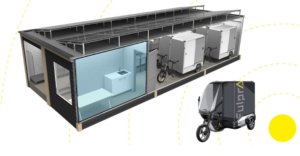Citylogistic 2.0 Energy neutral on ‘the last mile’ in city logistics

Citylogistic 2.0 is developing an innovative, intelligent and sustainable distribution system for ‘the last mile’ in city logistics in Groningen and Oldenburg.
The EU Interreg project Citylogistic 2.0 was recently launched. The project develops an innovative, intelligent and sustainable distribution system to reduce increasing emissions from logistics in city centres and is being tested in Groningen (Netherlands) and Oldenburg (Germany). The system that is to be built consists of an energetically self-sufficient, mobile mini-hub and a vehicle developed for this purpose, powered by the renewable energy provided by the mini-hub. In Citylogistic 2.0, ten German and Dutch partners are working together across borders, with OLEC Oldenburg (Germany) and New Energy Coalition Groningen (Netherlands) as project leaders. The project has a scope of EUR 5.4 million and runs until July 31, 2027.
In this pilot, direct delivery by truck or van -often running on diesel- from distribution centres to the customer is replaced in the last transport leg by climate-neutral delivery via a mini-hub. Innovative is the special combination of an energy self-sufficient mini-hub, a newly to be developed e-vehicle (Light Electric Freight Vehicle – LEFV) and the communication technology networks, as well as the dialogue between hub and vehicle. Automatic communication between mini-hub and vehicle takes place not only in terms of logistics data, but also in terms of energy management. The vehicles communicate independently with the hub and send information on the charging status and, if necessary, the route. The hub reports when a charging point is available and what the forecast looks like in terms of charging time.
Reducing emission-rich delivery traffic in neighbourhoods and cities
Trucks and vans bring roll containers to the mini-hub, the LEFVs deliver the shipments from the mini-hub to the customer. This reduces low-emission delivery traffic in residential areas and city centres. Test phases of 9-12 months are planned in the partner cities of Groningen and Oldenburg. Both cities are well comparable in their design and have high ambitions to reduce greenhouse gas emissions in the urban area. On the Dutch side, the aspect of increasing grid congestion plays a central role as well. Against this background, autonomous energy supply concepts can make a meaningful contribution.
The chosen location in the Netherlands is at Zernike Campus Groningen, with the best conditions to integrate the mini-hub into a simulated energy system – also against the background of seasonal use. With the new neighbourhood Helleheide (former airbase), as the location for the test phase on the German side, an innovative residential area is created that supports new concepts in the community and makes technical innovations available to residents. In Oldenburg, active citizen participation is therefore involved in the design and use of the mini-hub.
About Citylogistic 2.0
In the Citylogistic 2.0 project, ten German and Dutch partners work together across borders. This involves a comprehensive transfer of knowledge and technology in the programme area. As part of the project, two operational and test phases lasting several months are planned in the partner cities Groningen and Oldenburg. The project runs until 31 July 2027.
Partners:
Fulpra – JADE Hochschule – Rijksuniversiteit Groningen – Hanzehogeschool Groningen – Busmann – Loohuis – ElectricSpecial – Dynteq – OLEC – New Energy Coalition
(Associated: CitiPost – Stadt Oldenburg – Groene Rijders)

